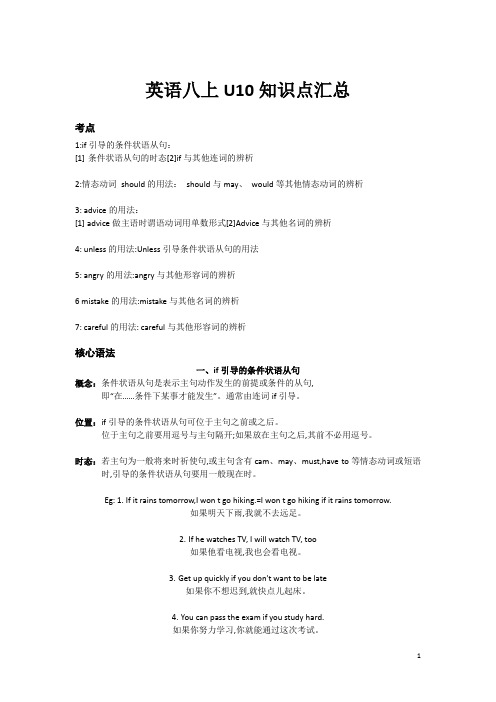人教版八年级英语上册语法归纳--条件状语从句
人教版八年级英语语法状语从句(条件,目的,让步)

A.Unless B.Though
•virvuisru['sva病iər毒əs]病毒 •cocroonraovnirauvsi[rkuəs,r冠əu状nə病'va毒iərəs] 冠状病毒 • 新冠肺炎: 英文名 “Novel coronavirus n(新opv型nee冠l uc状omr病oonn毒aiav肺”i,r简炎us)称简p“称nNe“CuNmPC”Pon” ia [njuː'məʊnɪə] • 抗击疫情:fight the epidemic
we can return to school.
If the epidemic comes to an end ,let's have a big dinner.
主将
主情 从现
主祈
Group 1 练习
( ) 1. ---What are you going to do this Saturday? --- I'm going to climb Mount Tai ____ it doesn't rain. A. so B. if C. unless
抗击疫情:fight the epidemic
If the epidemic comes to an end,
what will you do?
教学内容 (状语从句adverbial clause)
1.条件状语从句 2.目的状语从句 3.让步状语从句
1.条件状语从句
表示主句中的某一动作或状态 是在什么情况或条件下发生的。
no matter 疑问词 = 疑问词+ever
No matter what happened, he would not mind. Whatever happened, he would not mind.
Uni10 if 引导条件状语从句 课件 人教版英语八年级上册

Look and say
you
get up late
If you get up late, you’ll be late for school.
late for school
I我
If I have a lot of money, I will buy a big house.
Translation:
如果我有足够的钱,我就去环游世界。
If I have enough money, I will travel around the world.
=I will travel around the world if I have enough money.
Read and summarize 读下列例句,总结if的用法
If you study hard, you’ll pass the exam. =Study hard, and you’ll pass the exam.
If you don’t hurry up, you’ll be late. = Hurry up, or you will be late.
Please call me if he comes next Sunday.
用法三:主句是祈使句,从句 也要用一般现在时。 (主祈从现)
Exercises: 1.I _w_il_l _s_t_a_y_(stay )at home if Lucy _co_m__e_s (come) tomorrow.
If you want to lose weight, you must eat less bread.
Unit10if条件状语从句课件人教版英语八年级上册

用法2:如果主句含有must, may, can 等情态动词,从 句也要用一般现在时。
She is going to walk to school.
Shes to school, she m__u_s_t_ _b_e_late.
用法3:如果主句是祈使句,从句同样要用一般现在时。
It will be sunny tomorrow.
Let’s have a trip tomorrow.
If it __is__ sunny tomorrow, Let’s __h_a_v_e_ a trip.
If引导条件状语从句,遵循:
主将从现 主祈从现 主情从现
一、用括号内所给单词的正确形式填空。 have
___________________________.
If it is sunny this weekend, what won’t you do ?
If it is sunny this weekend, I ___w_o_n_’_t_s_t_a_y__a_t_h_o__m_e__.
If it is sunny this weekend, I _w__o_n_’_t _w_a__tc_h__t_e_le__v_is_i_o_n_.
If I have time, I’ll go to see you. I’ll go to see you if I have time.
从主有逗 主从无逗
最常用的引导词有:
• if 如果 • unless (= if not) 除非 • as long as 只要
1. If you want to know, I can tell you.
英语中考语法复习
If条件状语从句
英语八上U10知识点汇总 人教版

英语八上U10知识点汇总考点1:if引导的条件状语从句:[1]条件状语从句的时态[2]if与其他连词的辨析2:情态动词should的用法:should与may、would等其他情态动词的辨析3: advice的用法:[1]advice做主语时谓语动词用单数形式[2]Advice与其他名词的辨析4: unless的用法:Unless引导条件状语从句的用法5: angry的用法:angry与其他形容词的辨析6 mistake的用法:mistake与其他名词的辨析7: careful的用法: careful与其他形容词的辨析核心语法一、if引导的条件状语从句概念:条件状语从句是表示主句动作发生的前提或条件的从句,即“在……条件下某事才能发生”。
通常由连词if引导。
位置:if引导的条件状语从句可位于主句之前或之后。
位于主句之前要用逗号与主句隔开;如果放在主句之后,其前不必用逗号。
时态:若主句为一般将来时祈使句,或主句含有cam、may、must,have to等情态动词或短语时,引导的条件状语从句要用一般现在时。
Eg: 1. If it rains tomorrow,I won t go hiking.=I won t go hiking if it rains tomorrow.如果明天下雨,我就不去远足。
2.If he watches TV, I will watch TV, too如果他看电视,我也会看电视。
3.Get up quickly if you don't want to be late如果你不想迟到,就快点儿起床。
4.You can pass the exam if you study hard.如果你努力学习,你就能通过这次考试。
口诀:if引导的条件状语从句条件句不一般,几个要点记心间条件句,放在前,逗号要放句中间;条件句表可能,主将从现是关键。
(1)if引导的条件状语从句,通常可与以下句型相互转换:①祈使句+and/or+一般将来时的句子Eg:If you are quick, you won't be late for class.=Be quick, and you won't be late for class.=Be quick, or you will be late for class②含有介词wth或without的句子Eg:If there is no water, we can't live.= We can't live without water.(2)if除可引导条件状语从句外,还可引导宾语从句,意为“是否”。
八年级上册条件状语从句

八年级上册条件状语从句条件状语从句是指表达条件的从句,它通常由if或者whether 引导,用来说明某种条件下会发生什么情况。
在八年级上册的英语学习中,条件状语从句是一个重要的语法知识点。
在这个阶段,学生通常会学习一些基本的条件状语从句结构和用法。
首先,条件状语从句的基本结构是“if/whether + 主语 + 谓语”,例如,“If it rains, we will stay at home.”(如果下雨,我们会呆在家里)。
这个句子中,“if it rains”就是条件状语从句。
在八年级上册,学生通常会学习三种主要的条件状语从句,真实条件句、虚拟条件句和混合条件句。
真实条件句表示的是可能实现的条件和其可能发生的结果,例如,“If you study hard, you will pass the exam.”(如果你努力学习,你会通过考试)。
虚拟条件句则表示与事实相反或不太可能实现的条件和其可能发生的结果,例如,“If I were you, I would tell him the truth.”(如果我是你,我会告诉他实情)。
混合条件句则是真实条件句和虚拟条件句的混合使用,例如,“If he had listened to me, he wouldn't be in trouble now.”(如果他当时听我的话,现在就不会陷入麻烦了)。
此外,学生还需要注意条件状语从句中的时态和语态的运用。
一般来说,条件状语从句中的时态和主句的时态有一定的关系,例如真实条件句中,如果主句是一般现在时,条件句中可以使用一般现在时或者一般将来时;虚拟条件句中,如果主句是过去时,条件句中通常使用过去时的虚拟语气。
另外,需要注意的是,条件状语从句中的倒装结构在虚拟条件句中的使用,例如,“Had I known the truth, I would have helped him.”(如果我当时知道真相,我就会帮助他)。
人教版八年级上册英语 Unit 10单元知识点总结

人教版八年级上册英语Unit 10单元知识点总结Unit 10 If you go to the party, you’ll have a great time Grammar:含有if引导的条件状语从句的主从复合句复合句:一个主句和一个或一个以上的从句构成的句子条件状语从句:由连接词引导的句子在复合句中表示条件,作主句的条件状语when,as soon as,while,until等引导的时间状语从句,如果主句用一般将来时,此类状语从句与if引导的状语从句一样,也应用一般现在时代替将来时。
1.条件状语从句的引导词条件状语从句通常由连词if(如果,假如),unless(=if…not,除非,如果不)引导。
例:You will get good grades if you study hard. 如果你努力学习,就会取得好成绩If you don't leave right away,you will be late. 如果你不马上来,你将会迟到的2.条件状语从句的位置条件状语从句既可以放在主句之前,也可以放在主句之后放在主句之前,要用逗号与主句隔开放在主句之后,中间不必用逗号例:If it doesn't rain tomorrow,we will go shopping. 如果明天不下雨,我们将去购物You can pass the exam if you study hard. 如果你努力学习,你就会通过考试3.条件状语从句的时态若主句为将来时态或是含有情态动词的句子或祈使句,则条件状语从句用一般现在时例:He will not leave if it isn't fine tomorrow.如果明天天气不好,他就不会走。
(主句用一般将来时,从句用一般现在时)If he comes,let me know. 如果他来,让我知道(主句是祈使句,从句用一般现在时)知识点:1.have a good/great/wonderful time have fun=enjoy oneself玩得高兴,过得愉快(后接ving)2.half adj一半的,半个的常位于冠词之前n 半,一半复数形式,halvesTwo years and a half = two and a half years 两年半Half of ... 半数的half of 后面的名词或代词若为单数形式,谓语动词用单数形式若为复数形式,谓语动词用复数形式例:Half of the students are from China. 半数的学生来自中国Half of his life lives in the country. 他半辈子住在农村halfway adv 在中途部分地做(或达到)be/come/go halfway to doing sth. 完成某事的一半3.class 集体名词类似的集体名词有family,police,crowd,team,people等,作主语时,谓语用复数形式例:All my family are at home today. 今天我家人都在家Half the class come from the village. 一半的学生学生来自这个村庄class班级,表示整体,作主语谓语动词用单数形式例:Our class is in the fourth floor. 我们班在四层4.order及物动词订购,订货,点菜order sth.from 从某处订购某物order sb. to do sth.命令某人做某事例:I order some clothes from the Internet.Order him to act at once. 命令他立即行动order 秩序、顺序不可数名词例:Put the sentences in right order. 按正确的顺序排列句子in order to 或in order that 为了例:He gets up early in order to catch the early bus.=He gets up early in order thar he can catch the early bus.他早起床为了能赶上早班车5.too…to…太……而不能……too是副词,后跟形容词或副词原级,to是动词不定式符号,后跟动词原形too…to…结构可与so…that…结构进行转换too…to…结构可与not…enough to…结构互换,但not后面的形容词是too后形容词的反义词例:She is too young to go to school.=She is so young that she can't go to school.=She is not old enough to go to school.她太小了,还不能去上学6.be upset with sb.对某人感到不快,生某人的气7.英语中表示交通方式的表达方式:take+a/the+表示交通工具的名词by+表示交通工具的名词(用单数)前面不能有任何的修饰词walk to...drive to...fly to...对交通方式提问用疑问词how----How do you go to school?---By bus.8.a piece of advice9.travel v 旅行;游历n 旅行不可数名词如果要谈“某一次旅行”,则用trip或journeyaround the world=all over the world全世界travel around the world周游世界10.go to college 上大学11.seem 的用法:+ 形容词似乎……,好像……seem to do sth 好像要做某事12.join,join in与take part injoin 成为……的一员,参加,加入加入某一政党、团队、组织或人群join in 参加某种活动,尤其指和其他人一起参加某项活动take part in 强调参加会议、活动或比赛等,并且在活动中或比赛中发挥作用例:He joined the party in 1989. 他在1989年入党John took part in all the activities at school. 约翰参加学校所有的活动13.get an education获得教育14.keep…to oneself 保守秘密oneself是反身代词,我们已学过的反身代词有themselves,yourself,himself 15.unless用法小结:unless引导条件状语从句,含有否定意义= if…not,意为“除非;如果不……”在unless引导的条件状语从句中用一般现在时表示将来。
八上 条件状语从句
八上条件状语从句
条件状语从句是用来表示条件的句子,通常由连词if引导。
在八年级英语中,条件状语从句是一个重要的语法点,需要掌握其基本结构和用法。
条件状语从句的基本结构是:
“if + 条件状语从句,主句”。
例如:
If you work hard, you will succeed. (如果你努力工作,你会成功的。
)
在这个例子中,“If you work hard”是条件状语从句,“you will succeed”是主句。
条件状语从句中的时态:
在条件状语从句中,通常使用一般现在时来表示未来的情况,而主句则使用将来时态。
例如:
If it rains tomorrow, we will stay at home. (如果明天下雨,我们会在家里待着。
)
在这个例子中,“If it rains tomorrow”是一般现在时态,表示将来的情况,“we will stay at home”是将来时态,表示主句的动作。
需要注意的是,如果条件状语从句中的动作与主句的动
作同时发生,可以使用一般现在时或一般将来时。
例如:If you help me now, I will thank you later. (如果你现在帮助我,我以后会感谢你。
)
在这个例子中,“If you help me now”是一般现在时态,“I will thank you later”是一般将来时态,表示两个动作同时发生。
人教版八年级英语上册第十单元IF引导条件状语从句
第十四页,编辑于星期日:二十一点 分。
Fill in the blankets with the proper form
1.If It__r_a_in_s_ (rain) tomorrow, I ____w__il_l_s_ta(sytay)
第十九页,编辑于星期日:二十一点 分。
will come
I
___w__il_l_g_i_v_e(give)
the
massage
to
him.
第十六页,编辑于星期日:二十一点 分。
Look and say
If I’m ill,
_I_w_i_ll_s_e_e__a_d_o__ct_o_r___.
If I’m late,
_I_w_i_ll_s_a_y_s_o_rr_y______.
第七页,编辑于星期日:二十一点 分。
1. 如果主句是一般将来时,从句则用一般现在时。
If it rains(从句), I will stay at home.
I’ll go with you if you don’t want to go alone(从句).
2.如果主句含有must, may, can 等情态动词,从句也要用
7比较状语从句
3原因状语从句
8方式状语从句
4条件状语从句
9结果状语从句
5目的状语从句
第五页,编辑于星期日:二十一点 分。
If 引导条件状语从句
定义:If “如果, 假如” 它引导的句子表示某事发生所需的条
件,即“在…条件下,某事才能发生”,在句子中充当状语,因
人教版八上英语unit10 知识点归纳
unit10 知识点归纳语法: If引导的条件状语从句1. If引导的条件状语从句其时态为: 主将从现(主句为一般将来时,从句为一般现在时。
)eg: If you go to the party, you will have a great time.2. If引导的条件,状语从句,主句也可以是含有情态动词的句子或祈使句。
eg: If you want to get good grades, study hard.3. If引导的从句可放主句前也可放主句后,在主句前时要用逗号隔开。
eg: If you walk to school, you will be late.You will be late if you walk to school.4. 不会判断主句从句的同学请注意: if后为从句,剩余部分为主句。
eg: If you get up late, you will miss the train. (划线部分为从句) You will miss the train if you get up late. (划线部分为从句)知识点:1. meet v. 遇见meeting n. 会议2. organize 组织eg: I want to organize a party.3. potato chips 是复数名词,主语时be动词用复数。
4. advice 劝告,建议(不可数名词)eg: a piece of advice 一条建议some advice 一些建议5. travel to+地点去某地旅行eg: I want to travel to Shanghai.6. keep ...to oneself 保守秘密eg: I will keep it to myself.7. unless = if not 除非, 如果不(也可引导条件状语从句)8. be angry with sb 对某人生气be angry at sth 对某事生气eg: I'm angry with you. 我对你很生气。
Unit10单元语法:If引导的条件状语从句的用法(课件)-八年级英语上册单元语法精讲精练(人教版)
*一般过去时
* 复合不定代词
*频度副词 次数的表达 * How often…
*形容词副词的原级与比较级
Unit 4 What’s the best movie theater? Unit 5 Do you want to watch a game show? Unit 6 I’m going to study computer science. Unit 7 Will people have robots? Unit 8 How do you make a banana milk shake? Unit 9 Can you come to my party?
A.calling B.call C.to call D.will call
C 11.Our eyesight will become poorer and poorer ________ we spend too much time
playing the phone.
A.so
B.before C.if
he, come, next weekend, I, tell you If he comes next weekend, I will tell you.
如果他下周来,我会告诉你。
not rain, go hiking, this afternoon
If it doesn’t rain, I will go hiking this afternoon.
D.but
A 12.—Opportunity will come _________ we make our efforts.
—Yes. God helps those who help themselves.
- 1、下载文档前请自行甄别文档内容的完整性,平台不提供额外的编辑、内容补充、找答案等附加服务。
- 2、"仅部分预览"的文档,不可在线预览部分如存在完整性等问题,可反馈申请退款(可完整预览的文档不适用该条件!)。
- 3、如文档侵犯您的权益,请联系客服反馈,我们会尽快为您处理(人工客服工作时间:9:00-18:30)。
If 引导的条件状语从句点拨:一.if 引导条件状语从句时,为连词,意为“如果”。
句子的时态遵循“主将从现”的原则,即当主句为一般将来时,从句用一般现在时。
Eg:1. If I go to the movies, I won’t finish my homework.2. If I leave university, I’ll find a job in the city.3. If she likes it, she will read it soon.4. She won’t be late for school if she takes a taxi.5. If it doesn’t snow, he will play football with me tomorrow.6. If you don’t hurry up, you will be late again.7. If we have the party today, half the class won’t come.8. If I stay at home, I will catch the talent show.9. What will happen if your grandmother is free?10. The teachers won’t let in if you wear sunglasses.11. I’ll do it better if the teacher gives me another chance.12. If you don’t go to Lisa’s party, you’ll be sorry.13. If you stay at home, you’ll get bored.14. If I can’t pass the exam, my parents will be very upset.如果我考试通不过,我的父母将会很失望。
15.If farmers cut down trees and forests, gaint pandas will have nowhere to live.16.You will be late for school if you don’t get up early.17.---Would you like to go to the amusement park?---If Jack does, so will I.18.If you go to college, you’ll get a good education.19.I don’t know if it will rain. If it doesn’t rain, I will go camping.20.If I am free tomorrow, I will go shopping with her.21.If she goes to bed earlier, she’ll not be tired the next day.22.If you are famous, people will watch you all the time.23.If our school has a concert, I will watch it.24.I will never become a basketball player if I don’t exercise often.25.If it snows, I will stay at home.26.Tell him not to lend money to Tom. If he does, he can’t get the money back.27.We will climb the mountain if it doesn’t rain tomorrow.28.---We will go for a picnic if it doesn’t rain this Sunday.---Wish you a lovely weekend.29.We will take a trip if it doesn’t rain tomorrow.30.If you come tomorrow, I will call you.31.If you don’t have a ticket to the ball game, the workers there won’t let you in.32. What will happen if they pollute the river in front of the village?33. What will happen if your grandmother is free?34. If the weather is fine, we will have a sports meeting this weekend.35. If it doesn’t rain tomorrow, we’ll go hiking.36. We’ll go to the Summer Palace if it doesn’t rain this Saturday.37. The teacher won’t let you in if you are late for class.38. I think that Tom will do it better if his teacher gives him ten more minutes.39. If you walk there, you will be late.40. If you want to be an actor, taking acting lessons is necessary.41. If you want to improve your spoken English, you must speak it every morning.42. If you write down your name on the paper, you can get a magazine.43. You will learn better if you work harder.44. If you read a lot, your life will be full of pleasure.二.在if引导的条件状语从句中,主句也可以用情态动词表示可能的结果,并且主句也可以是祈使句。
Eg:1.If you see him, please give the note to him.2.Please give Alice the story book if you see her.3.Please try to practice English if you want to play basketball well.Unless 的用法点拨:一.Unless 作连词,意为“除非,如果不”,引导条件状语从句,它和if引导的条件状语从句一样,也在遵循“主将从现”的原则,即:如果主句用一般将来时,从句就用一般现在时。
Eg:1.Unless you have have tickets, you can’t go to the concert.2.You will fail unless you work harder.3. You won’t pass the exam unless you work harder.4. I won’t take part in Julie’s birthday party unless I aminvited.5.Unless you finish your homework, we can not goskating.6.The men will have to wait all day unless the doctorworks faster.7.Unless we deal with our problems, we can easilybecome unhappy.8.Unless bad weather stops me, I exercise every day.二.Unless 在意义上相当于if not,两者可以互换使用。
Eg:1.If you don’t start early, you can’t catch the early bus.=Unless you start early, you can’t catch the early bus.As long as 的用法点拨:As long as 意为“只要”,引导的条件状语从句,也在遵循“主将从现”的原则,即:如果主句用一般将来时,从句就用一般现在时。
Eg:1.I’ll try to help you as long as you tell me the truth.2.As long as she studies hard next term, she will make great progress.3.You can do everything as long as it’s right.4.You can watch TV as long as you finish your homework.5.As long as you don’t give up, your dreams will come true.6.You can get good grades as long as you work hard.。
